
David Paul Cronenberg is a Canadian film director, screenwriter, and actor. He is a principal originator of the genre commonly known as body horror, with his films exploring visceral bodily transformation, infectious diseases, and the intertwining of the psychological, the physical and the technological. Cronenberg is best known for exploring these themes through sci-fi horror films such as Shivers (1975), Scanners (1981), Videodrome (1983) and The Fly (1986), though he has also directed dramas, psychological thrillers and gangster films.

Naked Lunch is a 1991 surrealist science fiction drama film written and directed by David Cronenberg and starring Peter Weller, Judy Davis, Ian Holm, and Roy Scheider. It is an adaptation of William S. Burroughs' 1959 novel of the same name, and an international co-production of Canada, Britain, and Japan.
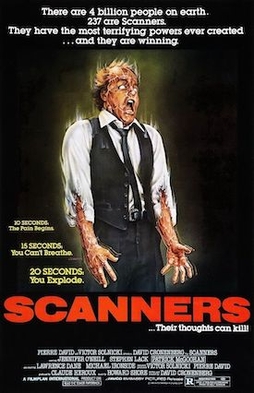
Scanners is a 1981 Canadian science fiction horror film written and directed by David Cronenberg and starring Stephen Lack, Jennifer O'Neill, Michael Ironside, and Patrick McGoohan. In the film, "scanners" are psychics with unusual telepathic and telekinetic powers. ConSec, a purveyor of weaponry and security systems, searches out scanners to use them for its own purposes. The film's plot concerns the attempt by Darryl Revok (Ironside), a renegade scanner, to wage a war against ConSec. Another scanner, Cameron Vale (Lack), is dispatched by ConSec to stop Revok.
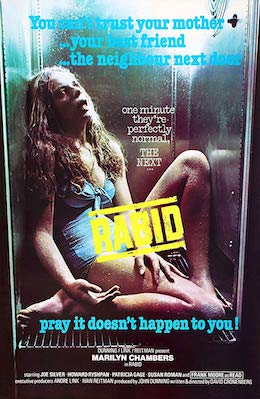
Rabid is a 1977 independent body horror film written and directed by David Cronenberg. An international co-production of Canada and the United States, the film stars Marilyn Chambers in the lead role, supported by Frank Moore, Joe Silver, and Howard Ryshpan. Chambers plays a woman who, after being injured in a motorcycle accident and undergoing a surgical operation, develops an orifice under one of her armpits that hides a phallic/clitoral stinger she uses to feed on people's blood. Those she bites become infected, and then feed upon others, spreading the disease exponentially. The result is massive chaos, starting in the Quebec countryside, and ending up in Montreal. Rabid made $1 million in Canada, making it one of the highest-grossing Canadian films of all time. A remake of the same name, directed by Jen and Sylvia Soska, was released in 2019.
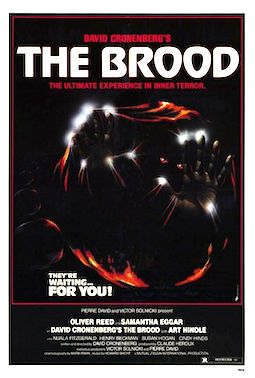
The Brood is a 1979 Canadian psychological body horror film written and directed by David Cronenberg and starring Oliver Reed, Samantha Eggar, and Art Hindle. Its plot follows a man and his mentally ill ex-wife, who has been sequestered by a psychiatrist known for his controversial therapy techniques. A series of brutal unsolved murders serves as the backdrop for the central narrative.
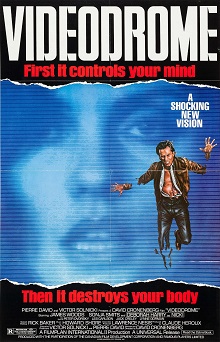
Videodrome is a 1983 Canadian science fiction body horror film written and directed by David Cronenberg and starring James Woods, Sonja Smits, and Debbie Harry. Set in Toronto during the early 1980s, it follows the CEO of a small UHF television station who stumbles upon a broadcast signal of snuff films. Layers of deception and mind-control conspiracy unfold as he attempts to uncover the signal's source.
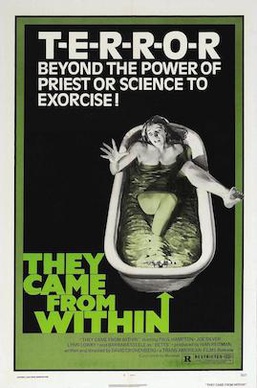
Shivers, also known as The Parasite Murders and They Came from Within, and, for Canadian distribution in French, Frissons, is a 1975 Canadian science fiction body horror film written and directed by David Cronenberg and starring Paul Hampton, Lynn Lowry, and Barbara Steele.
From the Drain is a 1967 Canadian short film directed by David Cronenberg.

Crimes of the Future is a 1970 Canadian science fiction film written, shot, edited and directed by David Cronenberg. Like Cronenberg's previous feature, Stereo, Crimes of the Future was shot silent with a commentary added afterwards, spoken by the character Adrian Tripod.
Camera is a 2000 Canadian short film written and directed by David Cronenberg. The six-minute short was one of several made for the special Preludes program in celebration of the 25th anniversary of the Toronto International Film Festival. These films, all by Canadian directors, were commissioned as preludes for the festival in 2000.
Transfer is a 1966 short film written, shot, produced, edited and directed by David Cronenberg. It features Mort Ritts and Rafe Macpherson and has a runtime of 7 minutes.
Mark Irwin is a Canadian cinematographer.

The Haunting of Sorority Row is a 2007 Canadian supernatural horror television film directed by Bert Kish, starring Leighton Meester, Kailin See, Lisa Marie Caruk, Carlo Marks, Agam Darshi, Elyse Levesque, Meghan Ory, and Adrian Roman Petriw. The film premiered on October 6, 2007, on Global in Canada and on Lifetime in the United States.

Scanners II: The New Order is a 1991 Canadian science fiction thriller film. It is a sequel to the 1981 feature film Scanners with a different cast, starring David Hewlett, Deborah Raffin, Raoul Trujillo, and Yvan Ponton. It was written by B. J. Nelson and directed by Christian Duguay. The plot involves a crooked police commissioner (Ponton) who schemes to gain control of a major city by manipulating Scanners to do his bidding. The film was released direct-to-video.
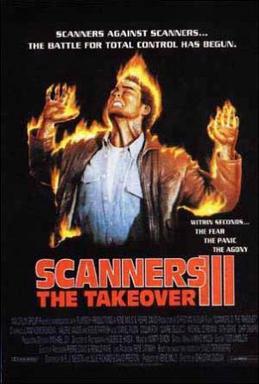
Scanners III: The Takeover is a 1992 Canadian science fiction horror film, the second sequel to the film Scanners. It was directed by Christian Duguay. The film received mixed reviews, and is the least successful Scanners film. This sequel has a different set of characters from either of the preceding films in the series.

Scanner Cop is a 1994 Canadian science fiction action horror film. It is the fourth film in the Scanners series and the first film in the Scanner Cop series. It was written, produced, and directed by Pierre David. Daniel Quinn stars as the title character, a police officer with psychic powers.

Scanners: The Showdown is a 1995 American science fiction film directed by Steve Barnett. It is the sequel to Scanner Cop and the fifth film in the Scanners series. Daniel Quinn returns as a psychic police officer who searches for a serial killer who targets other psychics.
Ronald Sanders is a Canadian film editor and television producer.
SD Blu-ray disc is a Blu-ray disc on which the main feature is standard-definition video instead of the high-definition video found on typical Blu-ray discs.

Shadow of the Hawk is a 1976 American-Canadian horror film directed by George McCowan and written by Norman Thaddeus Vane and Herbert Wright. The film stars Jan-Michael Vincent, Marilyn Hassett, Chief Dan George, Pia Shandel, Marianne Jones and Jacques Hubert. The film was released on July 14, 1976, by Columbia Pictures. The film was shot on location in British Columbia Canada using West Vancouver, Vancouver and the Lynn Canyon Suspension Bridge as backdrops throughout.














